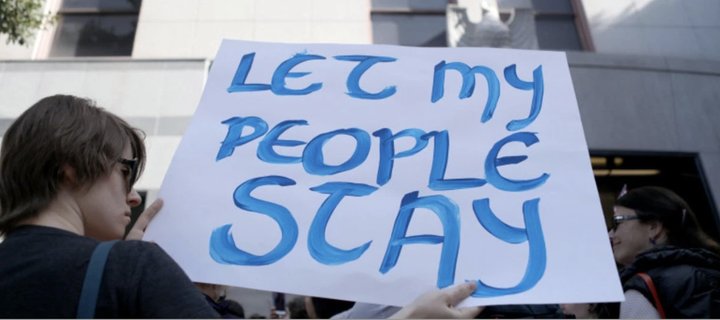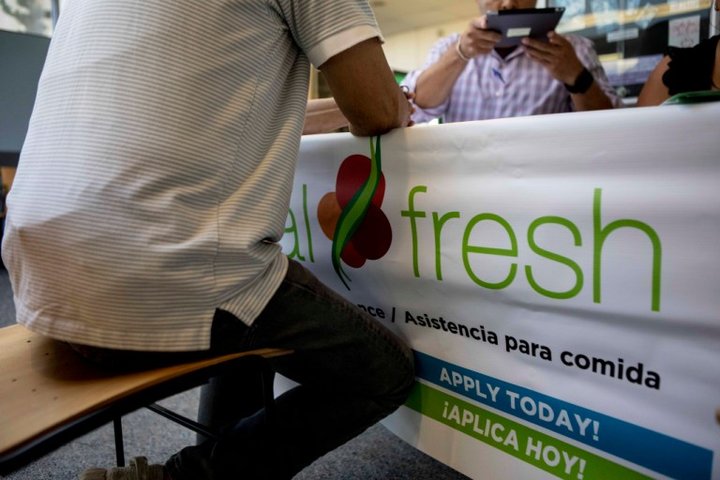
Supporters of immigration rally outside the Immigration and Customs Enforcement office in San Francisco, Friday Feb. 2, 2018. (Photo by Anda Chu/Bay Area News Group)
As President Donald Trump published controversial new rules on Monday making it harder for legal immigrants to get green cards if they use — or are likely to use — Medicaid, food stamps and other social safety net programs, California has reacted with anticipated outrage.
“This is a reckless policy that targets the health and well-being of immigrant families and communities of color,” Gov. Gavin Newsom said in a press release Monday morning.
“We will not stand idly by while this Administration targets programs that children and families across our state rely upon,” added Attorney General Xavier Becerra. “We are ready to take legal action to protect the rights of all Californians.”
The expansion of the so-called “public charge” rule was long-anticipated — as was the response in California, home to a disproportionate number of the nation’s immigrants and headquarters of the anti-Trump resistance.
The White House, meanwhile, has said the proposed new rules are intended to deny green cards to immigrants seeking U.S. benefits and to “promote the self-sufficiency of aliens within the United States.”
Here are six things to know about the latest immigration battle between the Trump administration and California.
What would this rule actually do?
Under the new regulation, legal immigrants into the United States could be denied permanent residency if immigration authorities deem them “likely at any time to” enroll in any number of public benefits for more than a year. The list of benefits includes food stamps, federal housing assistance and health insurance through Medicaid.
It’s an idea that the Trump administration has been kicking around since the very beginning of his presidency. Following multiple leaks to the press of versions of the rule, the Department of Homeland Security finally published a proposed draft last October. Today the administration published the finalized rule, which will go into effect 60 days from Wednesday.
The new rule would also discourage immigration officers from granting visas to those making less than 250% of the federal poverty line, those receiving healthcare subsidies through the Affordable Care Act and any applicant “likely to require extensive medical treatment or institutionalization.” The regulation also includes certain exceptions for immigrants serving the military, children, pregnant women and some students.
It’s one in a series of Trump administration initiatives that would curtail government benefits for low-income people and immigrants, including a proposal posted in late July that would cut food stamps to 3.1 million Americans.
Why the concern?
Since 1882, the federal government has given immigration authorities broad authority to keep people out of the country if they’re deemed likely to become “public charges” of the state. Though the term “public charge” is never actually defined, since 1999, immigration officials have applied it only to people likely to be “primarily dependent on the government for subsistence” through cash welfare programs or publicly-funded institutional care.
The new rule dramatically expands that definition to include “people who may have the occasion to one time use that type of benefit,” said Deep Gulasekaram, a professor of immigration and constitutional law at Santa Clara University.
“That is unprecedented,” he said. “And that is what truly makes this really a scary proposition for a lot of people.”
The new visa standards would — for now — only be used to approve or deny applications. But the Trump administration is also reportedly considering whether participation in these programs by otherwise legal immigrants could also be used as grounds for deportation.

An applicant signs up for food stamps, known as CalFresh in California, at a low-income health clinic in Contra Costa County. Under a new Trump administration rule, immigrants who receive public benefits may have a harder time getting green cards. Photo by Anne Wernikoff
Who in California would be directly affected?
Across the country, roughly 382,000 people applying for green cards would be reviewed to determine whether they are — or are likely to become — public charges under the new definition, according to the government. Given that nearly one in five people who received a green card between 2015 and 2017 lived in California, according to federal data, the rule will likely have an outsized impact on California green card applicants.
Advocates expect the impact to reach even farther. Many mixed status families are expected to unenroll from public benefits due to fear that the public charge rule would impact their or family members’ chances of adjusting their status in the future.
According to the UCLA Center for Health Policy Research, as many as 765,000 people across the state may lose access to Medi-Cal and food stamps due to fear alone.
The UCLA researchers project that the rule could have a particularly strong collateral impact on low-income children in California, where one in two children are part of an immigrant family. Nearly seven in ten Californians predicted to lose benefits would be children, according to the study.
The federal government offered up a much smaller estimate of the impact, predicting that just 9,632 households across the country would forego applying or disenroll.
Has talk of the new rule had a chilling effect already?
Yes. As different versions of the rule have been leaked and then proposed over the past two years, California service providers and advocates have reported immigrant families opting out of public benefits in large numbers.
Elizabeth Ambriz, a CalFresh outreach worker for the Food Bank of Contra Costa and Solano, says this is the main reason that people have given for not applying for food stamps in the past eight months she’s been on the job.
“There are a lot of people who are working on becoming permanent residents and their lawyers tell them ‘Do not get CalFresh because that will make you not be eligible to get your green card,’” Ambriz said in early August while tabling for CalFresh at a local health clinic.
Coupled with a decreasing unemployment rate, the looming new rule has been viewed by anti-poverty workers as a primary driver of a substantial decrease in enrollment in public benefits over the past two years.
One sign that immigrant families are already spooked in California is the drop in the number of households in which only children are eligible and enrolled in food stamps, usually because the parents are undocumented. These households declined by more than 40,000 in the state — including more than 85,000 children — between January 2018 and January 2019, according to an LAist analysis.
Meanwhile, a national poll by the Urban Institute of nearly 2,000 adults in immigrant families found that one in seven reported that someone in their family had declined a public benefit in 2018 because they didn’t want to risk a future green card. The effect was stronger among low-income families, Hispanic families and families with children.
Will California be suing?
Will the President will be tweeting? When the Trump administration announced a preliminary version of the rule late last year, Attorney General Xavier Becerra fired off a 51-page letter, in which he called the rule “not supported by evidence, logic, or Congressional action,” “an arbitrary and capricious attack with no legal justification” and, in short, “unlawful.”
As a preview of the state’s legal argument, the letter suggests Becerra may once again argue that the Trump administration failed to follow the rules that govern how new regulations must be introduced.
For anyone who has watched California take on the Trump administration again and again, it’s a familiar argument. The state has struck down or successfully delayed a number of new regulations by persuading a judge that the administration didn’t explain why a new rule was necessary, didn’t provide enough compelling evidence to support the justification or simply didn’t give the public enough time to weigh in on the change — all in violation of the federal Administrative Procedure Act.
But that argument may be harder to make in this case, said Gulasekaram.
“As a formal matter of changing the administrative rules, they complied with what is required,” he said, adding that courts give “a lot of deference” to agencies when deciding how to interpret a vaguely written law, particularly in immigration law.
Given the California Justice Department’s propensity for taking the Trump administration to court, state prosecutors could be typing up a complaint as you read this. Asked about a possible lawsuit, the press office for the Office of the Attorney General provided a short written response: “Stay tuned!”
Why does this remind me of California in the 1990s?
According to reporting from Politico, Stephen Miller, one of President Trump’s most loyal and truculent policy advisors, has been the driving, hectoring force within the White House for this regulatory shift.
The Santa Monica-born 33 year old was only 9 in 1994, when a majority of Californians passed Proposition 187, denying most public services to undocumented immigrants. The proposed constitutional amendment was later thrown out by the state Supreme Court. But Miller seems to be channeling the spirit of Prop. 187 anyway, said Mike Madrid, a GOP consultant and frequent critic of his own party and President Trump.
Alongside more aggressive immigration crackdowns, the administration’s family separation policy and ceaselessly hostile immigration rhetoric, Madrid sees this latest regulation as yet another bid to “stoke the fire” and keep the party’s base energized for 2020.
“Will it work? It might for another two years,” said Madrid. “But if history is a guide those two year gains will lead to a generation of evisceration (for the Republican Party) at the national level.”
Despite winning the overwhelming support of California’s electorate, many experts say that Prop. 187 turned an entire generation of Latino voters away from the California Republican Party. Many political commentators have drawn parallels to that moment in California history and the current political climate nationally.
“The textbook has been written,” said Madrid. “The history is not old. It’s in the last decade or so.”
Today, proposals to extend legal protections and social services to immigrants who have entered the country illegally enjoy broad support in California, and any policy that could be characterized as an attack on legal immigrants isn’t likely to be well-received.
###
CALmatters.org is a nonprofit, nonpartisan media venture explaining California policies and politics.
CLICK TO MANAGE